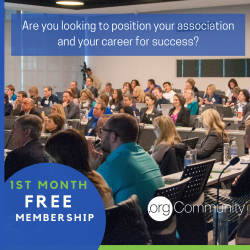Guarantee Your Success—Network Like Your Career Depends on It

What’s the single best thing you can do for your career? It doesn’t require special training, it’s never too late to get started, better still, it will return your investment of energy and effort many times over. With all those pluses, why isn’t building a strong network at the top of every leader’s list of professional goals?
Trading business cards comes naturally for me. It’s a fortunate accident of DNA. Although there are lots of extraverts in the association community, not everyone loves to mix and mingle with a new crowd. Even gregarious people may not enjoy introducing themselves to an unfamiliar audience. Others simply don’t want to take the time to cultivate growing a far-reaching base of support.
I understand the temptation to skip the happy hour or stay glued to the phone during the conference lunch. Putting yourself out there is the equivalent of a cold sales call, you need to summon a little chutzpah. But when you make networking a priority, you gain wisdom, friendship, and a hedge against economic and market uncertainty.
I credit my network for a large measure of my professional development and success. Who you know is almost always as important as what you can do. You might be a super CEO but without anyone to rely on for expert advice, your vision is limited, and the corner office is a lonely place. Or if by some twist of fate you lose that big chair, it might take a village to find another.
For everyone who grits their teeth through the networking breakfast, I’ll offer some tips that might help you smile, and begin building a team of colleagues who will support you through the inevitable challenges of leadership.
Get Involved
The best way to conquer the stage fright of confronting a room full of strangers is to make sure there’s always a friendly face in the crowd. Joining a professional association is, obviously, preaching to the choir. But collecting acquaintances isn’t good enough. You need to make friends. The more you put yourself in contact with people who have common interests, issues, and experiences, the more likely that will be.
My business partner, Kevin Ordonez, and I co-founded .orgCommunity based on that premise. As consultants, connecting people to others who can help them solve problems is a big part of our business. We wanted to provide a networking and professional development venue where those relationships could grow. .orgCommunity’s CEO circles and Think Tanks offer the focused, small group interaction that helps executives to quickly build a panel of trusted advisors.
Gain Perspective Along With Relationships

There are plenty of options for creating this experience. When Kevin and I interviewed CEOs for our Association 4.0 books: Positioning for Success in an Era of Disruption and An Entrepreneurial Approach to Risk Courage and Transformation, almost every leader emphasized the importance of peer-to-peer learning in their success.
Joanna Pineda, Founder, CEO, and Chief Trouble Maker, Matrix Group International, Inc., explained it like this: “The CEO needs to be in tune with the larger business environment. I belong to a CEO peer group called Vistage. We meet once a month. Most of the members are running businesses larger than mine in very different industries, but our concerns are surprisingly similar. Association executives are really lucky. They can take advantage of .orgCommunity’s leadership circle groups where they can compare notes with executives who are on parallel journeys. The opportunity to share challenges, in confidence, with the brightest colleagues in the business is an invaluable resource.”
Sandy Marsico, Founder and CEO, Sandstorm Design echoes Pineda’s advice: “I’m a huge believer in peer advisory groups. I was a member of Vistage for ten years. Now I participate in the Women Presidents’ Organization, C200—a collection of female business owners, and Tech Master Minds—technology CEOs who meet once a month to share ideas. I also had the special privilege of chairing .orgCommunity’s Women in Association Leadership Circle.
“I am inspired by every CEO I meet. I’m fascinated by how they overcome barriers and what they’ve accomplished despite challenges along the way. Each leader has a backstory, and they have all experienced risk. They’ve felt the same punch in the stomach that I have when I lose. They know what it’s like to take a deep breath and dive in even though the water is freezing. I love hearing how they did it.”
Forget Yourself
From time to time, everyone has sore thumb syndrome, this is especially true in a room full of strangers. There is a tendency to imagine that all eyes are turned your way. Trust me, It’s never all about you. Focus on what you can offer others, not on how they are evaluating you. What unique career experiences do you bring to the conversation?

Consider how you can make a difference in your community. This idea can also translate to helping your members make the right connections too. As CEO for the Association for Intelligent Information Management, Peggy Winton feels a commitment to help others advance in their careers. Supporting women is an important part of that goal. She explains her vision like this:
“I wanted to ask how women in this industry could better help each other. We launched a Women in Information subgroup to our community last year. We now have over 2,000 members who are actively involved. We didn’t want it all to focus on technology or industry education. We really wanted to highlight helping other women achieve leadership roles within their organizations, on boards of directors, and within the AIIM community. I hope this will be a pipeline for our own board, and I view my younger staff in that same way. I want to create opportunities for them.”
Make a Plan
I’m always more confident with a plan in my back pocket; even if circumstances knock me off a carefully plotted course. Before your next networking opportunity, (And, by the way, networking isn’t just for conferences. Think creatively about where you can make new connections.) Consider these ideas:
- Is there a specific outcome that you are hoping to accomplish? Are you looking for expert advice, leads for a new position, or simply to expand your horizons? You don’t need to have a goal, but it helps to make conversations more productive.
- Review the list of attendees to identify specific people you want to meet. Then, determine whether you have common connections who could provide an actual introduction or serve as the introduction to a conversation.
- Reflect on your story. What will be interesting to others? Why should they want to know you? What might you have in common? If you have an elevator speech, that’s great. But keep it natural, friendly, and approachable. Remember it’s not about who you are. It’s about how you can help.
- Follow up with your new colleagues. Send a short email to let people know that you enjoyed chatting with them. They’ll remember that courtesy next time you meet.
Be Deliberate

Growing your network shouldn’t be an ad hoc process. It’s a significant professional responsibility and should be treated that way. Having a broad reach benefits your organization and boosts your personal accomplishments. But in my view, the biggest reward is that collaborating with a great group of mentors and friends makes whatever work you do more important and meaningful.

